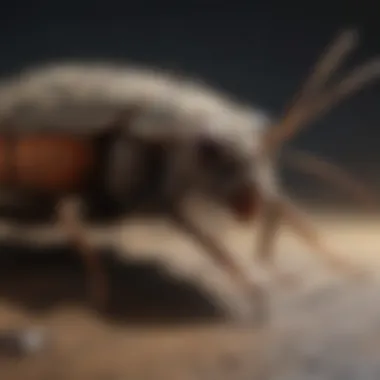Massey Services and Pest Management in Leesburg FL


Intro
Pest management is a crucial aspect of maintaining a healthy living environment. In Leesburg, Florida, where the climate is warm and humid, various pests thrive, posing different challenges to homeowners. Understanding these challenges and how to effectively manage them can significantly enhance the quality of life. Massey Services has developed strategies specifically tailored to this unique context. This article aims to dissect these practices, highlighting the significance of integrating sustainable approaches in pest management.
Pest Identification
Common Household Pests
In Leesburg, residents often encounter several common pests. These include:
- Ants: Various species like fire ants and sugar ants can invade homes, often in search for food.
- Termites: These insects can cause extensive damage to wooden structures and are a severe concern in Florida.
- Roaches: American and German cockroaches are frequently seen in households.
- Mosquitoes: Given the moist climate, mosquitoes breed easily, leading to nuisance and health risks.
- Rodents: Mice and rats are common, especially during the cooler months when they seek warmth.
Signs of Infestation
Identifying a pest problem early significantly aids in management. Homeowners should watch for:
- Droppings: Finding droppings can indicate the presence of rodents.
- Gaps or holes: Check for entry points where pests might enter the home.
- Damaged wood: Indicators of termites include hollow sounds or shredded wood.
- Nests: Some pests create visible nesting areas, which can help in identification.
"Early detection is key in effective pest management, as it allows for more options in control strategies."
Prevention Methods
Environmental Modifications
Modifying the environment can help reduce pest activity. Here are effective measures:
- Eliminate standing water: This reduces mosquito breeding sites.
- Proper waste disposal: Ensure garbage is sealed and disposed of regularly to deter ants and cockroaches.
- Landscaping: Trim bushes and trees away from the house to decrease pest habitat.
Home Maintenance Tips
Regular home maintenance is essential in pest prevention. Consider these tips:
- Seal cracks and openings: This prevents entry of rodents and insects.
- Maintain gutters: Clean them frequently to avoid water accumulation.
- Store food properly: Use airtight containers to keep pests away from food sources.
DIY Pest Control Solutions
Natural Remedies
Many homeowners prefer natural remedies over chemical solutions. Some effective ones include:
- Vinegar: It can deter ants and other pests when used as a cleaning agent.
- Essential oils: Oils like peppermint or tea tree have pest-repelling properties.
DIY Traps and Barriers
Creating traps and barriers can also assist in pest control. Simple solutions include:
- Homemade traps: For example, a jar filled with a bait such as peanut butter can lure and trap mice.
- Physical barriers: Apply caulk to seal openings around windows and doors.
Understanding the specific pest challenges faced in Leesburg is vital for effective long-term management. By identifying pests correctly and implementing significant preventive measures, homeowners can create safer, pest-free environments. Additionally, knowledge of DIY solutions supports sustainable pest management, aligning with broader environmental objectives.
Prelude to Pest Management in Leesburg, Florida
Pest management is a critical concern for homeowners and property managers in Leesburg, Florida. The unique ecosystem of this region presents specific challenges that necessitate a tailored approach to pest control. This section introduces the foundational concepts of pest management in Leesburg, focusing on the various elements that shape effective strategies. Understanding the local environment, the types of pests prevalent in the area, and the importance of timely intervention are all crucial for maintaining healthy living spaces.
Overview of Leesburg's Ecosystem
Leesburg lies within a warm climate zone characterized by humid summers and mild winters. The region boasts a diverse collection of flora and fauna. This biological richness can create habitat for various pests.
Several factors contribute to the ecosystem's pest management dynamics:


- Soil Type: The sandy soil in Leesburg affects various pests, including subterranean termites, which thrive in such conditions.
- Weather Patterns: The seasonal fluctuations in temperature and rainfall influence pest life cycles, making certain periods more susceptible to infestations.
- Human Activity: Urban development and agricultural practices can either mitigate or exacerbate pest populations.
Recognizing these elements is key in developing effective pest management strategies throughout Leesburg that consider natural and anthropogenic influences.
Importance of Pest Control
Effective pest control is vital for both health and economic reasons. Pests can harbor diseases, damage property, and decrease the quality of life for residents and visitors alike.
Here are some significant reasons why pest management is essential in Leesburg:
- Health Concerns: Certain pests, like mosquitoes and rodents, can transmit diseases, posing serious health risks to the community.
- Preservation of Property: Infestations such as termites can cause extensive and costly damage to homes and buildings if not addressed.
- Aesthetic Appeal: A pest-free environment enhances the visual appeal of properties and contributes to neighborhood pride.
- Economic Efficiency: Effective pest management strategies can reduce the overall costs associated with pest damage and the interventions required to mitigate them.
"Understanding the context of pest management empowers homeowners to take proactive measures in safeguarding their environments."
The integration of local knowledge, environmental considerations, and pest management methods lays the groundwork for effective control measures. This understanding is especially important in a place like Leesburg, where the ecosystem plays a significant role in pest dynamics.
Massey Services: A Brief Overview
Massey Services plays a crucial role in the pest management landscape of Leesburg, Florida. Understanding its foundation and the range of services offered helps in comprehending the dynamics of pest control in the region. Their expertise is specifically tailored to address the unique pest challenges faced by local homeowners and businesses. This overview sets the foundation to appreciate how Massey Services contributes to creating pest-free environments while maintaining an understanding of ecological balance.
History and Establishment
Founded in 1985, Massey Services has built a reputation based on reliability and effectiveness. The company's history traces back to its commitment to high-quality pest control solutions. Over the years, it has expanded significantly, adapting to changing pest management needs and implementing advanced techniques.
Their establishment in Leesburg marks a significant presence in the area. Residents have since benefited from their local knowledge and tailored approaches to pest challenges. This localized focus not only enhances the efficiency of pest management strategies but builds trust within the community.
Services Offered
Massey Services provides a variety of pest management solutions suitable for both residential and commercial clients. Each service addresses specific pest concerns to create a comprehensive pest control strategy. Here are the details of the primary services:
Residential Pest Control
Residential pest control is essential for protecting homes from unwanted pests like ants, roaches, and termites. This service is beneficial for homeowners seeking peace of mind regarding their living spaces. Massey's residential pest control uses a combination of preventative measures and targeted treatments. The key characteristic is a personalized plan that considers the unique pest profile of the home. Its specialized approach reduces the need for frequent treatments, making it a popular choice among Leesburg residents. However, homeowners must remain proactive by following up on recommendations provided by the pest management team.
Commercial Services
Massey’s commercial services focus on ensuring that businesses operate in pest-free environments. This service is essential for maintaining a professional image and complying with health regulations. The primary advantage of these services is their adaptability to various business types, ranging from restaurants to warehouses. Massey implements effective strategies that minimize disruptions to business operations, which is a considerable benefit during peak hours. One challenge is the need for regular assessments and updates to pest control plans to remain effective in dynamic commercial settings.
Termite Control
Termite control is a specialty that addresses one of the most damaging pest threats for homeowners and property managers. Termites can compromise the structural integrity of wooden structures, leading to costly repairs. Massey Services offers advanced termite detection techniques and treatment options that are critical in protecting properties. The unique feature of their termite control service is the integration of inspection and prevention methods. This comprehensive approach ensures swift action against infestations before they escalate. However, it’s crucial for homeowners to maintain vigilance, as termites can be elusive and difficult to detect in initial stages.
In summary, the diverse services offered by Massey Services not only provide essential pest management solutions but also promote a deeper understanding of pest biology and behaviors. This knowledge equips homeowners and businesses with the tools necessary to curb pest challenges effectively.
Understanding the unique needs of the Leesburg area enables Massey Services to tailor their approach, ensuring sustainability and efficacy in their methods.
Common Pests in Leesburg
Understanding the common pests in Leesburg is crucial for effective pest management in the area. This section details the specific pests that homeowners may encounter. By recognizing these pests and their characteristics, individuals can better prepare for infestations. Effective pest management depends on identifying the pest types prevalent in a region. It also highlights the importance of localized knowledge when addressing pest issues.
Identifying Local Insect Species
Ants
Ants are one of the most frequently encountered pests in Leesburg. Their social behavior and ability to form colonies make them a significant vector for various issues. Ants can contaminate food and cause damage to structures over time. They are also known for their resourcefulness in finding food, which can lead them indoors. In this article, recognizing ants’ presence helps in timely intervention. Homeowners can implement strategies to deter these pests before they establish colonies inside.
Key characteristic: Ants have a structured social system, often working together to find food and defend their nests.
Unique features: Ants can adapt to different environments, making them both a challenge and an opportunity for pest control discussions.
Termites


Termites pose a significant threat to homes in Leesburg, primarily due to their wood-eating behavior. They can silently devastate wooden structures, often going unnoticed until considerable damage has occurred.
Key characteristic: Termites work in colonies, consuming wood and plant material, which can severely compromise the integrity of a home.
Unique feature: The ability of termites to consume wood quickly means that regular inspections are necessary. This species’ presence makes awareness and professional pest management essential in protecting property.
Rodents
Rodents, namely mice and rats, are creatures often found in urban areas, including Leesburg. Their capacity for reproduction and ability to gnaw through various materials make them troublesome. Rodents can pose risks to health by contaminating food and spreading diseases.
Key characteristic: Rodents are nocturnal and very resourceful in their search for food and shelter.
Unique features: Their agile bodies allow rods to infiltrate homes easily. Therefore, preventive measures such as keeping food sealed and setting traps are important in pest control efforts.
Seasonal Pest Trends
Pest activity can significantly vary throughout the seasons in Leesburg. Understanding these trends can help homeowners anticipate and prepare for infestations. Certain pests may thrive during warmer months, while others emerge as temperatures drop. Recognizing these patterns allows individuals to adopt proactive pest management. For instance, ants may become more visible in the spring, prompting necessary countermeasures to limit their access to homes. Overall, having an awareness of seasonal changes enhances strategic planning and resources in pest control.
Integrated Pest Management Strategies
Integrated Pest Management (IPM) serves as a keystone in modern pest management approaches. In Leesburg, Florida, where diverse ecosystems exist, IPM strategies resonate with both ecological integrity and effective pest control. The focus on integration allows for a multifaceted approach that blends various techniques while minimizing adverse environmental impacts. This article will delve into the significance of IPM, emphasizing its components, benefits, and its unique adaptability to the pest challenges faced by residents of Leesburg.
Understanding IPM
IPM embodies a comprehensive strategy that unites biological, cultural, and mechanical methods to manage pest populations. The core principle revolves around understanding the life cycles and behaviors of pests, which aids in making informed management decisions. Through regular monitoring and assessment, homeowners can identify pest populations early and deploy targeted interventions. IPM stands out through its holistic framework, where prevention takes precedence, thereby reducing the need for chemical pesticides. By prioritizing a sustainable approach, IPM not only addresses current pest issues but also promotes long-term ecological health and resilience.
Massey’s Approach to IPM
Massey Services employs a distinctive philosophy towards IPM. Their strategies encompass not just immediate pest control, but also long-term prevention and education. The company's commitment to sustainable practices is evident through two principal aspects: monitoring and assessment, as well as targeted prevention techniques.
Monitoring and Assessment
Monitoring and assessment are vital components within Massey’s IPM framework. It involves systematic observations of pest populations and environmental conditions that promote infestations. The key characteristic of this practice is its proactive nature. Homeowners gain insights into pest behavior patterns, leading to informed decision-making. This method is a beneficial choice as it helps identify potential issues before they escalate.
One unique feature of monitoring is the integration of technology, which allows real-time data collection and analysis. This improves accuracy in assessing pest presence and determining the best course of action. While the approach has numerous advantages, including reduced reliance on chemicals, it requires diligent and routine observations. Nevertheless, the benefits of ongoing monitoring far outweigh the minimal disadvantages, making it a cornerstone of effective pest management in Leesburg.
Prevention Techniques
Prevention techniques constitute another essential strategy in Massey’s IPM approach. These methods focus on creating an environment that deters pests from intruding. The primary characteristic of these techniques is their preventive action. Homeowners are educated on best practices, such as sealing entry points and maintaining cleanliness to reduce pest attractions. Implementing these techniques is a practical choice, as it minimizes the necessity for interventions later on.
An important aspect of prevention includes the use of natural barriers and habitat modifications. These unique features assist in creating unfavorable conditions for pest habitation. Although there might be initial efforts and adjustments required during implementation, the long-term payoff is significant. By fostering a proactive stance, these techniques empower homeowners to maintain pest-free environments sustainably.
In summary, integrated pest management strategies represent a crucial evolution in pest control, particularly within diverse ecosystems like Leesburg.
Environmental Considerations
Environmental considerations in pest management are of utmost importance, especially in a diverse ecosystem like that of Leesburg, Florida. These considerations directly impact both the effectiveness of pest control methods and the sustainability of the surroundings. By understanding and prioritizing environmental factors, homeowners and pest management professionals can better navigate the challenges posed by pests while ensuring that local ecosystems remain healthy.
Sustainability in Pest Management
Sustainability in pest managemnt emphasizes the long-term well-being of the ecosystem while addressing pest issues. Implementing sustainable practices means that pest control solutions should minimize harm to the environment. For example, Massey Services in Leesburg often incorporates Integrated Pest Management (IPM) techniques, combining several strategies to manage pests effectively while reducing chemical use.
Benefits of Sustainable Pest Control:
- Reduced Chemical Exposure: By utilizing non-chemical methods and only applying chemicals sparingly, there is less risk to non-target organisms in the environment.
- Long-Term Effectiveness: Sustainable methods often focus on preventing pest problems rather than simply treating them after they occur. This proactive approach leads to lasting solutions.
- Enhanced Biodiversity: Healthy ecosystems are supported when harmful chemicals are minimized, allowing for a balance between pest control and preserving beneficial species.
These ethical approaches to pest management not only address current pest challenges but also ensure that future generations can enjoy a balanced and thriving environment.
Impact of Chemicals on Local Ecosystems
The impact of chemicals on local ecosystems is a crucial consideration for pest management practices. In Leesburg, the application of pesticides and other chemicals can have far-reaching effects. These substances can disrupt local flora and fauna, lead to water contamination, and negatively affect soil health.
Key Points to Consider:
- Soil Health: Frequent use of certain chemicals can compromise soil health, making it difficult for plants to obtain necessary nutrients.
- Water Sources: Runoff from treated areas can pollute local water bodies, harming aquatic life and disrupting ecosystems.
- Nontarget Species: Chemicals do not only affect target pests; they can also harm beneficial insects, birds, and other wildlife.


"A critical balance must be struck between effectively managing pests and preserving the integrity of the local ecosystem."
To mitigate these impacts, it is essential for pest control operations to explore alternatives, such as organic treatments and natural repellents. The main focus should be on minimizing the footprint of intervention methods on the environment, whilst effectively managing pest populations.
In summary, recognizing the interplay of pest management with environmental health is paramount. Homeowners in Leesburg must be informed about these considerations, fostering practices that protect both their homes and their local ecosystems.
DIY Pest Control Practices
DIY pest control practices play a vital role in maintaining a pest-free environment in Leesburg, Florida. As homeowners encounter various pest challenges, understanding the methods available for self-managed pest control can be highly beneficial. These practices not only provide immediate solutions but can also be cost-effective compared to hiring professional services. However, it is crucial for individuals to recognize when DIY methods are sufficient and when it is more prudent to seek professional intervention.
Effective Home Solutions
Natural Repellents
Natural repellents are a popular choice for managing pest issues. They consist of substances derived from plants or other organic materials, making them safer for family and pets. Some common ingredients in natural repellents include essential oils like peppermint and cedar. The key characteristic of these repellents is their ability to deter pests without toxic chemicals. This aligns well with the growing trend of sustainable living and health-conscious choices.
However, their effectiveness may vary, and while some homeowners find great success, others might discover limited results, especially with persistent infestations.
Traps and Baits
Traps and baits are another effective DIY solution often used for controlling pest populations. Unlike sprays or chemicals, traps work by luring pests into a containment area, making them a safe choice for indoor use. The primary benefit of traps and baits is their targeted approach—the pest is attracted to the bait but remains contained, preventing further spread. One popular option is the use of sticky traps for insects like cockroaches or ants. However, these methods do require regular monitoring and maintenance to ensure effectiveness.
Using traps and baits can significantly reduce pest visibility, fostering a more comfortable living environment.
When to Call a Professional
Despite the advantages of DIY pest control practices, there are situations when calling a professional is necessary. When infestations become severe, or when there are potential health risks involved, seeking expert assistance is advisable. Pest control specialists provide comprehensive solutions and have access to tools and methods that may not be available for DIY enthusiasts. Additionally, they can identify the root causes of infestations root that may not be visible to the untrained eye.
Understanding when to shift from DIY to professional help ensures effective pest management without compromising one's safety or health.
Collaborative Efforts for Community Pest Control
Collaborative efforts play a crucial role in effective pest management for communities like Leesburg, Florida. By working together, residents and local organizations can better address pest-related issues. This cooperation not only amplifies the response to pest problems, but it also enhances the overall well-being of the community. The shared knowledge and resources help combat pests in a sustainable manner while fostering a sense of unity among residents.
Educating Locals
Education is the foundation of successful community pest control initiatives. Providing local citizens with clear, relevant information about pest behaviors and the risks associated with infestations is vital. Workshops, informational flyers, and community meetings can serve as effective methods to disseminate knowledge.
Homeowners often overlook simple sanitation practices that can deter pests. For instance, routinely cleaning kitchens and securing trash bins can significantly minimize attraction for pests like ants and rodents. Moreover, understanding seasonal trends can prepare residents for pest invasions. For example, awareness of termite activity during warm months can push homeowners to inspect their properties thoroughly.
"Knowledge is power. An informed community is more equipped to tackle pest issues proactively."
When local residents have access to educational resources, they can make informed decisions about pest management techniques, especially sustainable practices. Having a well-informed community helps to reduce the dependency on chemical pesticides and promotes natural alternatives, benefiting local ecosystems.
Engaging with Local Organizations
Partnerships with local organizations amplify the efforts in pest management. Establishing connections with schools, environmental groups, and health departments can create a unified front against pest issues. Local organizations often have greater outreach capabilities and access to additional resources.
Engagement with these bodies can facilitate workshops or community clean-up days dedicated to pest prevention. By collaborating, everyone from schools to city officials can implement practices that reduce pest habitats. For example, schools can teach children about the importance of cleanliness in parks and homes, while local organizations can focus on educating families about long-term pest control methods.
Moreover, local organizations often have insight into state or federal initiatives regarding pest management. Keeping abreast of regulations and best practices can significantly enhance local approaches and boost community welfare initiatives.
End and Future Directions
As we discuss pest management in Leesburg, Florida, particularly through the lens of Massey Services, it becomes clear that effective pest control is paramount. The complexities of local ecosystems require tailored strategies to tackle specific pest challenges. In this article, we have covered integral aspects of pest management that can directly benefit homeowners.
Recap of Key Points
- Understanding Local Ecosystems: The exceptional characteristics of Leesburg's environment necessitate specific pest management approaches.
- Common Pests Identified: Awareness of pests such as ants, termites, and rodents helps in discerning the necessary actions to take.
- Integrated Pest Management Strategies: Massey Services employs a comprehensive IPM approach, emphasizing prevention and monitoring.
- Sustainable Practices: The importance of reducing chemical usage rightly aligns with the goals of modern pest management, promoting a healthier environment.
- Community Engagement: Education and collaboration among local organizations strengthen pest management efforts across the region.
Continued Innovation in Pest Management
Innovation is crucial in pest management, especially in places like Leesburg. Continued research is necessary to develop better products and strategies, keeping pace with changing pest behavior and environments. Advances in technology offer promising methods for monitoring pest populations and implementing effective control strategies.
Furthermore, integrating technology with traditional pest management can enhance efficiency. For instance, smart traps can monitor pest activity in real time. This data aids in making informed decisions about intervention. Additionally, ongoing education for pest control professionals ensures that they stay updated with the latest practices.
Innovative approaches such as biopesticides, which utilize natural organisms, are gaining traction. These options minimize chemical exposure while effectively dealing with pests. Homeowners benefit from these advancements, promoting safer pest control methods.
Ultimately, recognizing the need for ongoing change and innovation will ensure that communities like Leesburg remain resilient against pest challenges.















